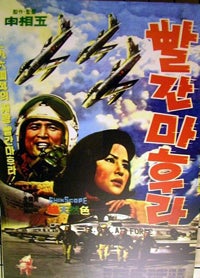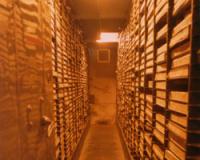We arrived in Busan, Korea from Los Angeles, after more than 15 hours of travel and a 16-hour time difference, having flown for the first time in a new A380 wide-body, double-decker Airbus. Busan is the country’s second largest city and a major port on the Pacific Ocean that, thanks to Korea’s economic miracle in the last 30 years, has as many skyscrapers as Chicago.
 The 17th iteration of the Busan International Film Festival, widely believed to be the most energetic movie fest in Asia, also featured the 2nd Busan Cinema Forum, which brings together filmmakers, academics, and lay people for discussions on a myriad of aesthetic and industrial issues concerning world cinema. This year’s theme for the Forum was “Politics of Film Preservation and Restoration in the Digital Age,” which attracted a host of international archivists to Busan. I was asked to give the keynote speech on the morning of Monday, October 8, a mere 12 hours after my arrival to my seaside hotel.
The 17th iteration of the Busan International Film Festival, widely believed to be the most energetic movie fest in Asia, also featured the 2nd Busan Cinema Forum, which brings together filmmakers, academics, and lay people for discussions on a myriad of aesthetic and industrial issues concerning world cinema. This year’s theme for the Forum was “Politics of Film Preservation and Restoration in the Digital Age,” which attracted a host of international archivists to Busan. I was asked to give the keynote speech on the morning of Monday, October 8, a mere 12 hours after my arrival to my seaside hotel.
During my address, the most surprising intervention from the floor came from a young Korean, who stated that it is the ultra sharp, clean digital image that young people appreciate and champion and that therefore my complaint that digital images are inherently flat carries little weight with his generation. That made sense, given that the present younger generation has grown up on comic books, computers, and digital video games. I hate to sound old, but do I really want to watch movies on my iPhone?
"I hate to sound old, but do I really want to watch movies on my iPhone?"
 The first afternoon session involved a panel featuring Laurence Kardish, the soon-to-be-retired Senior Curator at the Museum of Modern Art, Department of Film; Jean-François Rauger, Program Director at the Cinémathèque Française; Akira Tochigi of the National Film Center, Tokyo; and Bong-young Kim of the Korean Film Archive–-all of whom discussed film programming challenges in the face of the new digital paradigm. The second afternoon session saw Douglas Laible from the World Cinema Foundation, and Rufus De Rham from the New York Asian Film Festival—which has begun organizing an archive for popular Asian cinema—discussing the politics of selection criteria for film preservation. As I told De Rham, I was impressed that this graduate of New York University’s Moving Image Archiving & Preservation program had essentially created a job for himself by founding an archive.
The first afternoon session involved a panel featuring Laurence Kardish, the soon-to-be-retired Senior Curator at the Museum of Modern Art, Department of Film; Jean-François Rauger, Program Director at the Cinémathèque Française; Akira Tochigi of the National Film Center, Tokyo; and Bong-young Kim of the Korean Film Archive–-all of whom discussed film programming challenges in the face of the new digital paradigm. The second afternoon session saw Douglas Laible from the World Cinema Foundation, and Rufus De Rham from the New York Asian Film Festival—which has begun organizing an archive for popular Asian cinema—discussing the politics of selection criteria for film preservation. As I told De Rham, I was impressed that this graduate of New York University’s Moving Image Archiving & Preservation program had essentially created a job for himself by founding an archive.
The Forum’s second day began in the afternoon with a talk by Davide Pozzi, Director of L’Immagine Ritrovata, the laboratory of Cineteca di Bologna, who discussed the film preservation work flow at the lab. This was illustrated with an incredibly detailed restoration report on Lewat Djam Malam (Indonesia, 1954) that included photos and minute descriptions of every imperfection in the original nitrate masters, allowing the preservation team to document every step in the process. Two Korean colleagues, Im Sik Ok and Kisoo Shon, then presented their work digitally restoring the very popular 1960s Korean color film, Red Scarf (1964, Shin Sang-ok).
 In the second afternoon session, Lalitha Gopalan, a professor at the University of Texas at Austin, and Sungji Oh of the Korean Film Archive discussed their respective work. Gopalan demonstrated the use and misuse of archival footage in Ketan Mehta’s Indian film, Mengal Penday: The Rising (2005). Oh introduced a very detailed analysis on the survival rates of Korean films from the silent period to the present, and the efforts of the Korean Film Archive to find and preserve their national patrimony.
In the second afternoon session, Lalitha Gopalan, a professor at the University of Texas at Austin, and Sungji Oh of the Korean Film Archive discussed their respective work. Gopalan demonstrated the use and misuse of archival footage in Ketan Mehta’s Indian film, Mengal Penday: The Rising (2005). Oh introduced a very detailed analysis on the survival rates of Korean films from the silent period to the present, and the efforts of the Korean Film Archive to find and preserve their national patrimony.
Meanwhile there are so many films to see at the Festival and so little time, including the first North Korean film ever to be shown in South Korea, Comrade Kim Goes Flying (2012)…






 Mobile Navigation
Mobile Navigation

